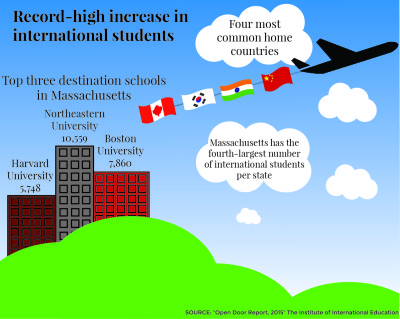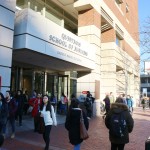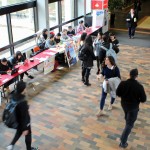
The number of international students in the U.S. experienced a 10 percent increase over the past year, according to the 2015 Open Doors Report on International Education Exchange released Monday. In response to the surge, Boston University created programs for incoming international students to adjust to college life in America.
Released by the Institute of International Education, the report ranked Massachusetts the fourth-highest state to host foreign students with a total of 55,447 students in the past year. With a total of 974,926 foreign students studying in the U.S. between 2014 and 2015, California, New York and Texas were ranked first, second and third, respectively.
“This year’s Open Doors Report illustrates important strides in making international education accessible for all,” Elaine Clayton, spokesperson for the U.S. Department of State’s Bureau of Educational and Cultural Affairs, said in an email.
The report also ranked BU a higher education institution with the second largest international student population in Massachusetts with 7,860 students. Northeastern University was ranked first with 10,559 international students and Harvard University third with 5,748.
In an effort to accommodate this surge in students from around the world, BU added Carolina Sopper to the BU Global Programs team as the assistant director of international student initiatives.
“Because everyone has their existing job functions, it’s helpful to have one person who is able to focus on the increase of international students on campus to make sure they are thriving academically and emotionally,” Sopper said.
BU also reached its personal goal of achieving a freshman international class of 24 percent, Amanda Miller, BU Global Programs’ spokesperson, said in an email.
“It is a huge advantage to our entire student body,” Miller said. “You have now had the opportunity to meet and learn from people from 130 countries and hopefully gain a deeper understanding of people and cultures different from yours.”
The International Students and Scholars Office initiated programs such as the Academic Success Workshop Series for International Students to ease adjustment of attending school in the U.S. for foreign students, Miller said.
BU particularly focused on international freshmen within the classroom where the Educational Resource Center “collaborated with other offices on campus to design a Freshman Year Experience course targeting second semester international freshmen,” Miller said.
Miller said the course will combine “First Year 101,” a current offering that introduces students to the university, with lectures that the BU Libraries, Center for English Language and Orientation Programs, ERC, ISSO and the Writing Center.
Miller said she believes BU’s experience with managing international students enables the university to build on its success.
“International students know that not only will they be in classes and able to make friends with American students, they will also have the opportunity to interact and learn from students from all over the world,” she said. “That is pretty amazing.”
Enze Yan, a senior from Beijing in the College of Arts and Sciences, said the high global exposure at BU is what, cultural adjustments aside, originally drew him to the school.
“The culture shock is definitely a hardship,” he said. “When other people are laughing and you don’t understand why and what they are laughing about — it really takes time.”
Jane Evans, a sophomore from England in CAS, said she appreciates the freedom and variety of the curriculum offered.
“In England, the university program is somewhat restrictive, you start narrowing down the subjects you want to study from age 16,” she said. “I didn’t know what I wanted to study, but everyone said, ‘Go to the U.S., you can do whatever you want there.’”




